Organization and internal auditing activities in Vietnamese firms: Situations and solutions
Abstract:
Today auditing plays an important role in corporate governance. Internal auditors have
derived from the desire of the managers. This study analyzes the current situation of
internal audit organization and operations in Vietnamese firms, thus pointing out the
limitations and causes of limitations and proposing solutions to perfect the organization
and Internal audit activities in the firms.
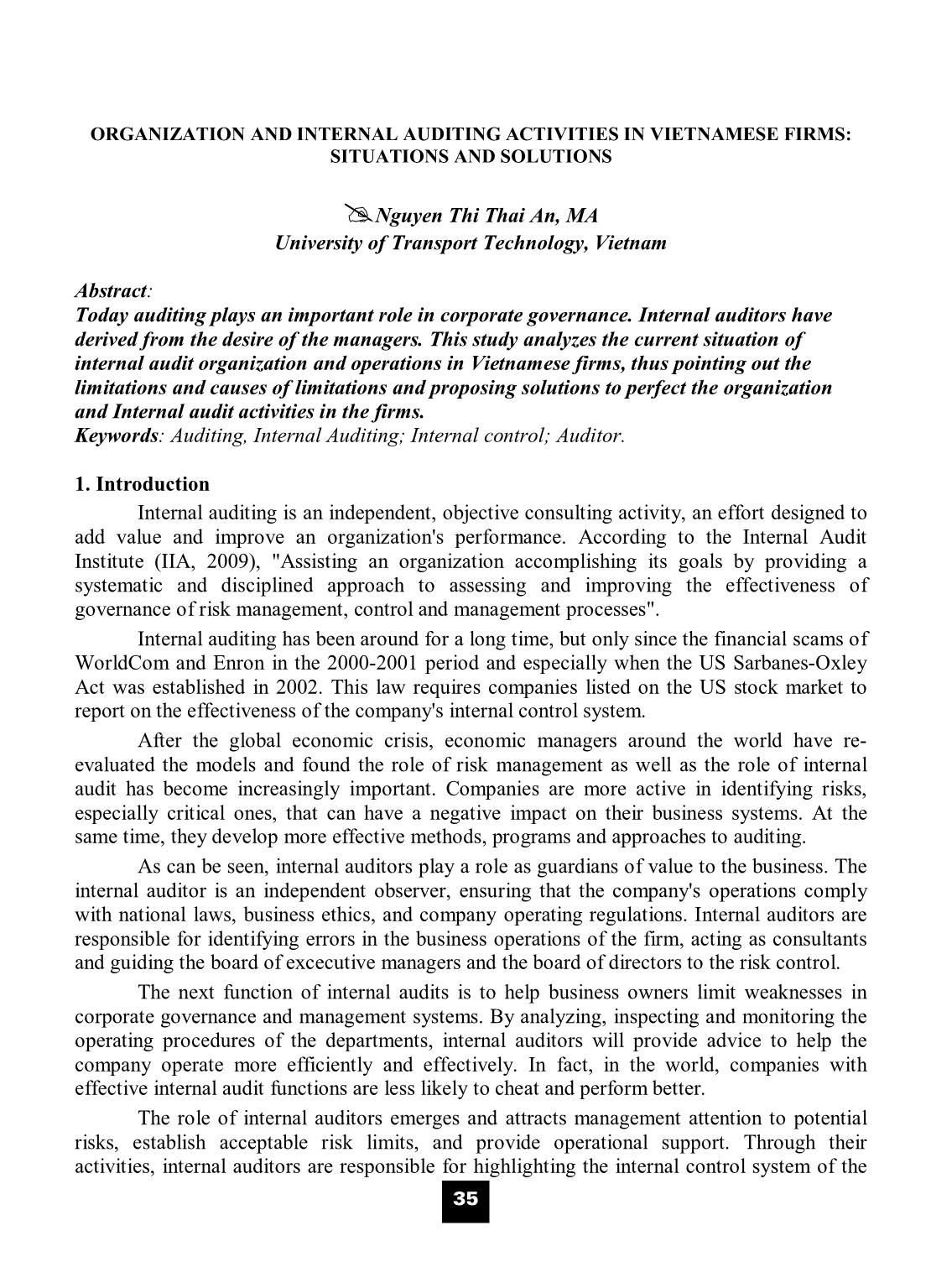
Trang 1
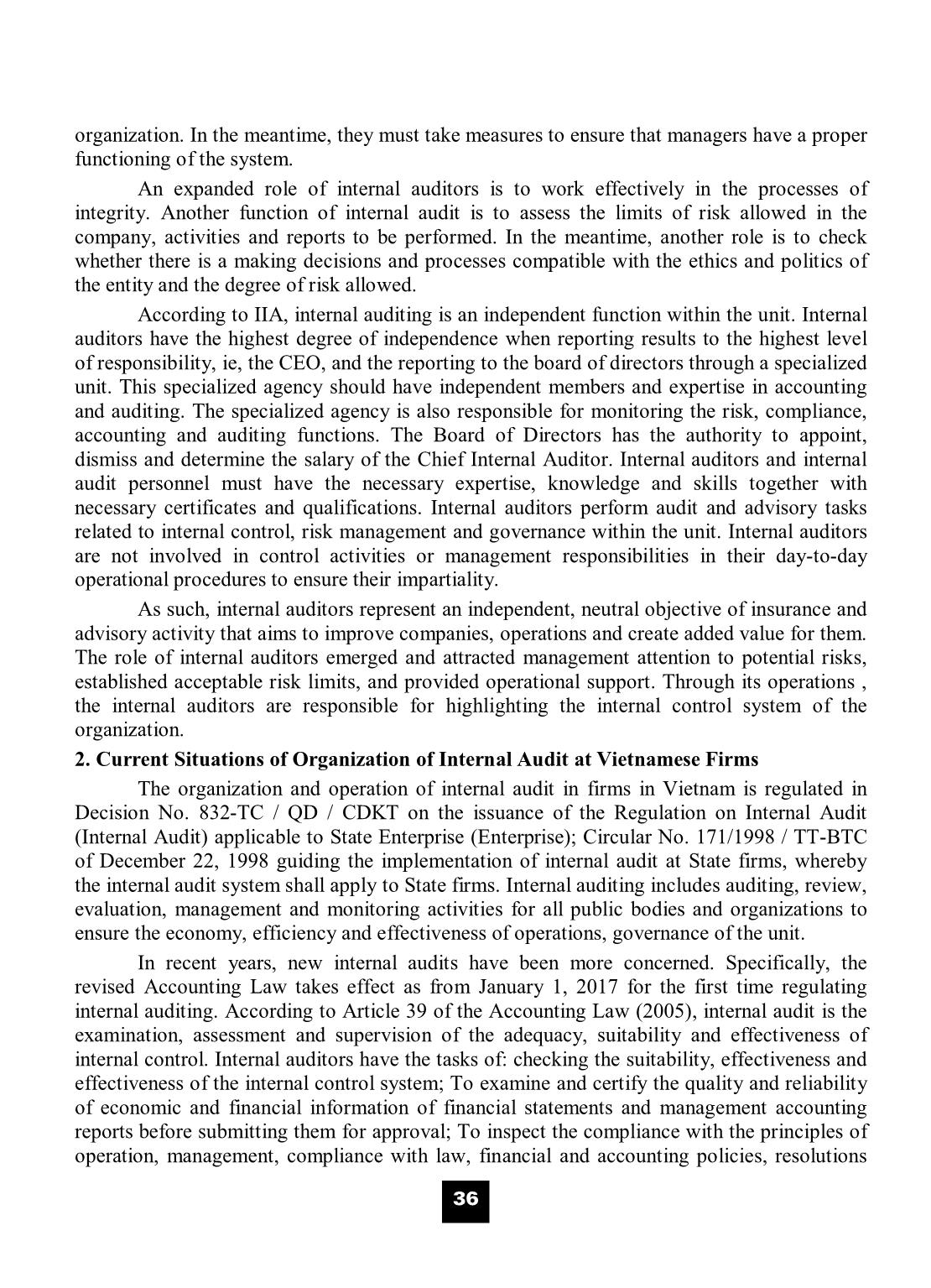
Trang 2
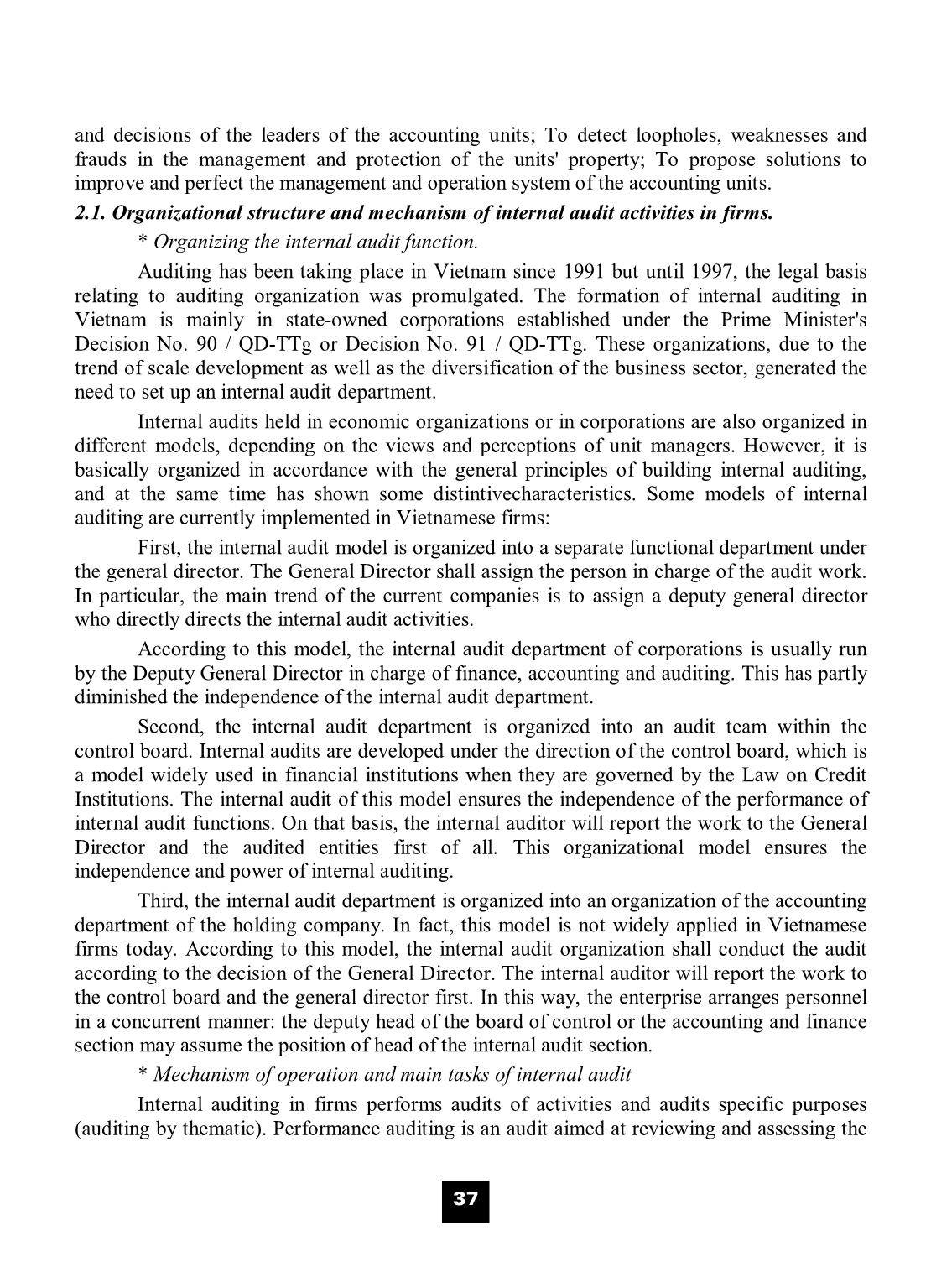
Trang 3
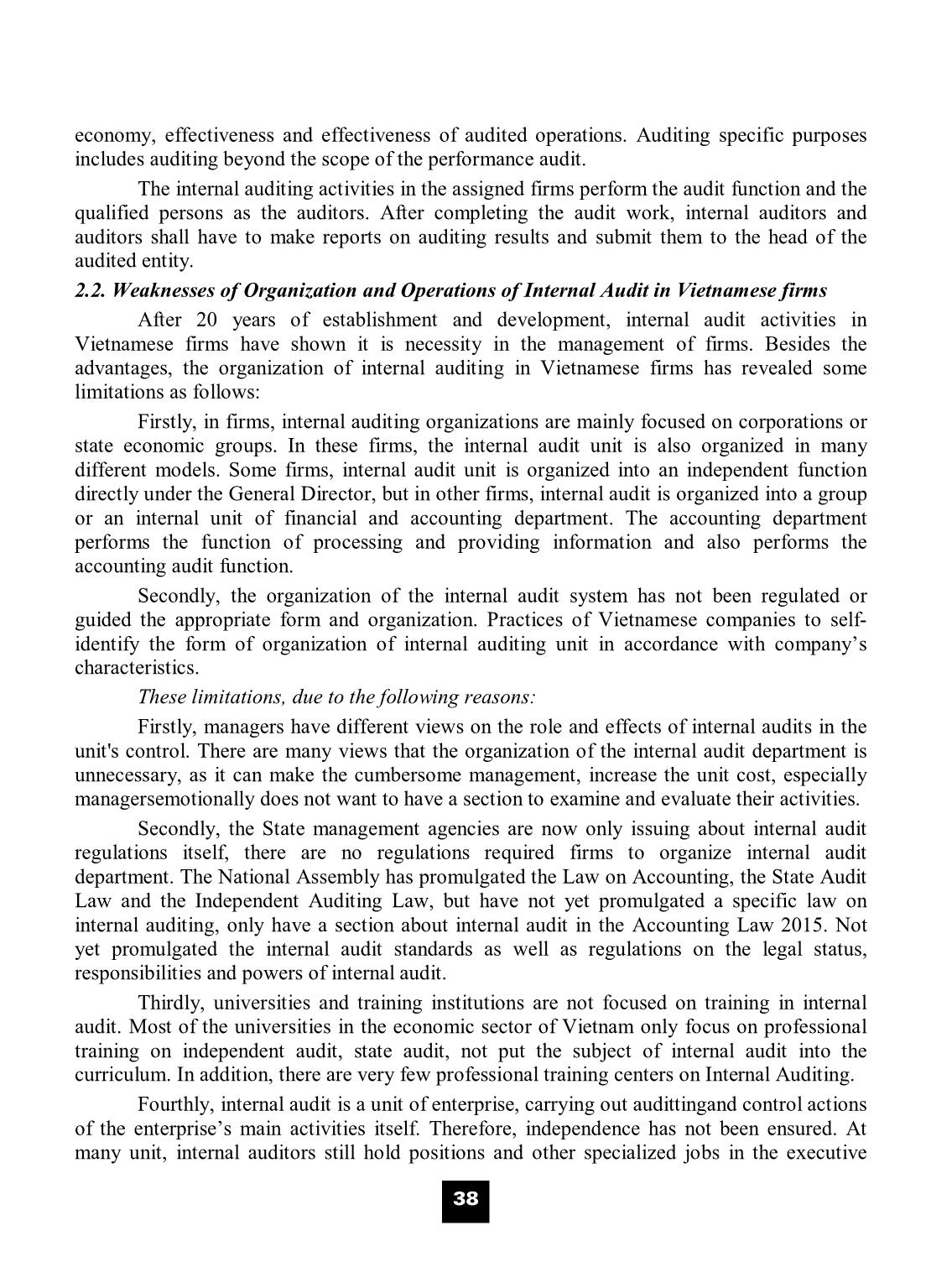
Trang 4
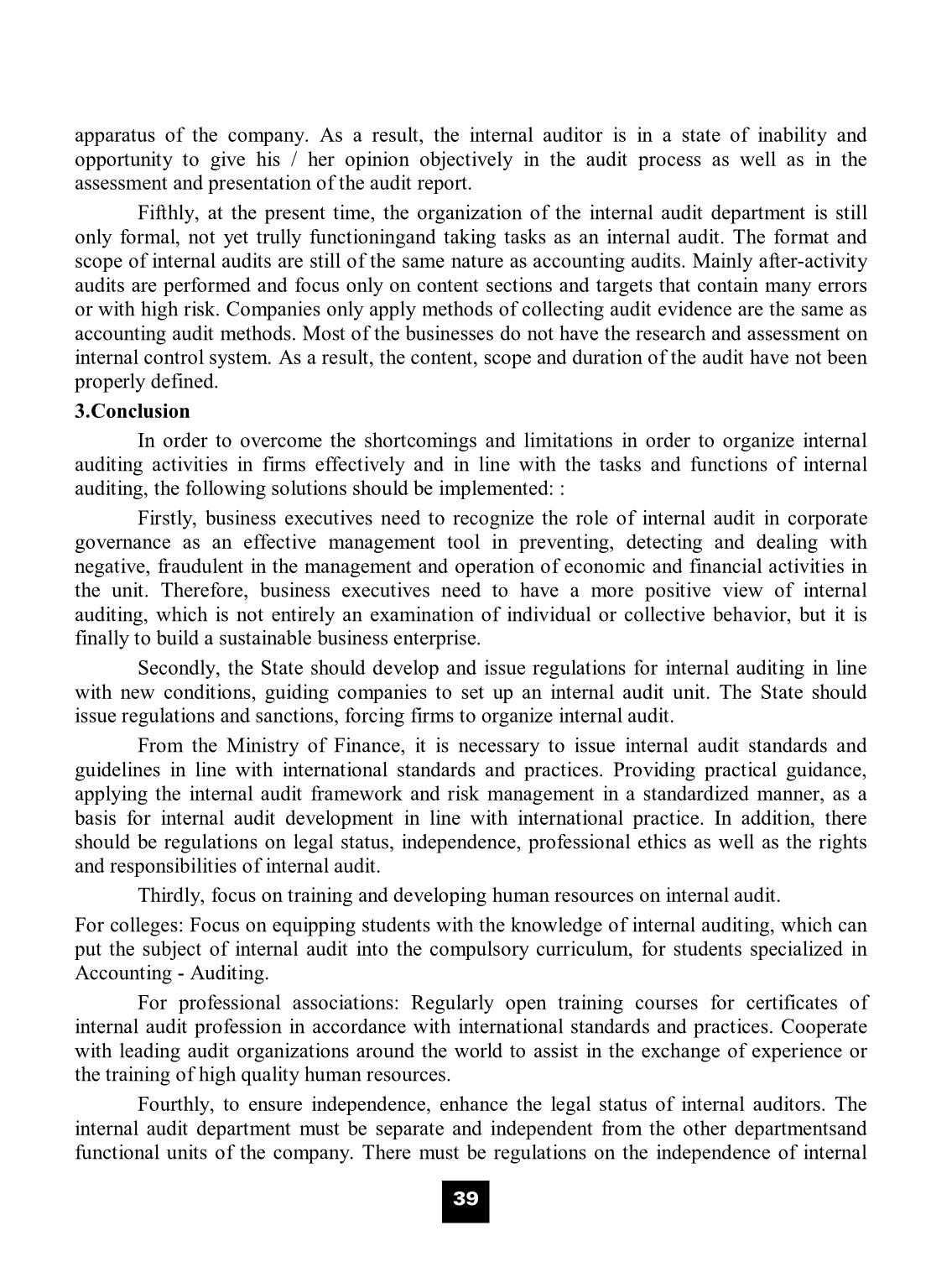
Trang 5
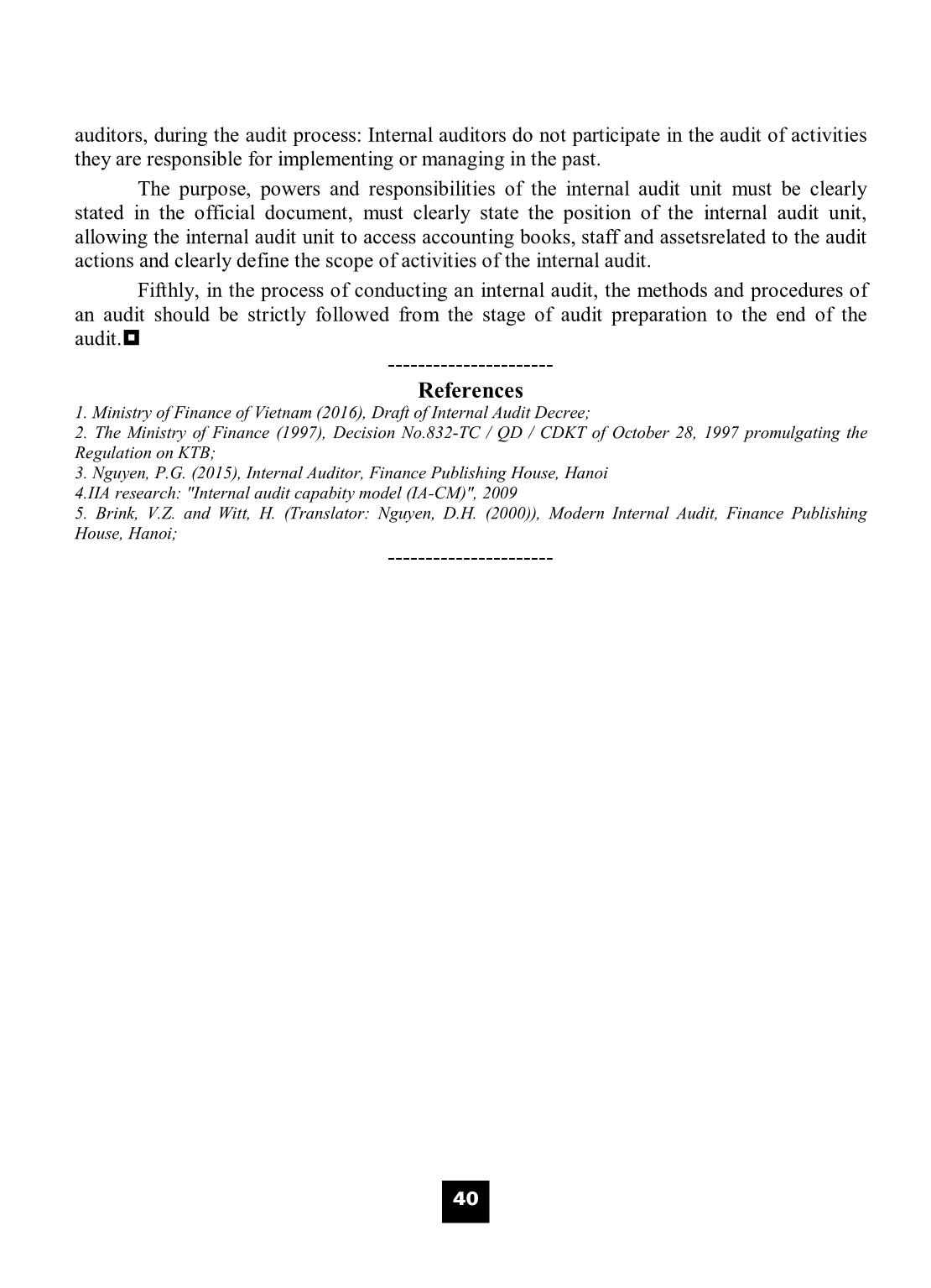
Trang 6
Bạn đang xem tài liệu "Organization and internal auditing activities in Vietnamese firms: Situations and solutions", để tải tài liệu gốc về máy hãy click vào nút Download ở trên
Tóm tắt nội dung tài liệu: Organization and internal auditing activities in Vietnamese firms: Situations and solutions
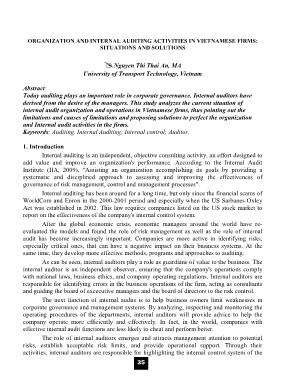
allowed in the company, activities and reports to be performed. In the meantime, another role is to check whether there is a making decisions and processes compatible with the ethics and politics of the entity and the degree of risk allowed. According to IIA, internal auditing is an independent function within the unit. Internal auditors have the highest degree of independence when reporting results to the highest level of responsibility, ie, the CEO, and the reporting to the board of directors through a specialized unit. This specialized agency should have independent members and expertise in accounting and auditing. The specialized agency is also responsible for monitoring the risk, compliance, accounting and auditing functions. The Board of Directors has the authority to appoint, dismiss and determine the salary of the Chief Internal Auditor. Internal auditors and internal audit personnel must have the necessary expertise, knowledge and skills together with necessary certificates and qualifications. Internal auditors perform audit and advisory tasks related to internal control, risk management and governance within the unit. Internal auditors are not involved in control activities or management responsibilities in their day-to-day operational procedures to ensure their impartiality. As such, internal auditors represent an independent, neutral objective of insurance and advisory activity that aims to improve companies, operations and create added value for them. The role of internal auditors emerged and attracted management attention to potential risks, established acceptable risk limits, and provided operational support. Through its operations , the internal auditors are responsible for highlighting the internal control system of the organization. 2. Current Situations of Organization of Internal Audit at Vietnamese Firms The organization and operation of internal audit in firms in Vietnam is regulated in Decision No. 832-TC / QD / CDKT on the issuance of the Regulation on Internal Audit (Internal Audit) applicable to State Enterprise (Enterprise); Circular No. 171/1998 / TT-BTC of December 22, 1998 guiding the implementation of internal audit at State firms, whereby the internal audit system shall apply to State firms. Internal auditing includes auditing, review, evaluation, management and monitoring activities for all public bodies and organizations to ensure the economy, efficiency and effectiveness of operations, governance of the unit. In recent years, new internal audits have been more concerned. Specifically, the revised Accounting Law takes effect as from January 1, 2017 for the first time regulating internal auditing. According to Article 39 of the Accounting Law (2005), internal audit is the examination, assessment and supervision of the adequacy, suitability and effectiveness of internal control. Internal auditors have the tasks of: checking the suitability, effectiveness and effectiveness of the internal control system; To examine and certify the quality and reliability of economic and financial information of financial statements and management accounting reports before submitting them for approval; To inspect the compliance with the principles of operation, management, compliance with law, financial and accounting policies, resolutions n trÞ - Kinh nghiÖm quèc tÕ vµ thùc tr¹ng ë ViÖt Nam 37 and decisions of the leaders of the accounting units; To detect loopholes, weaknesses and frauds in the management and protection of the units' property; To propose solutions to improve and perfect the management and operation system of the accounting units. 2.1. Organizational structure and mechanism of internal audit activities in firms. * Organizing the internal audit function. Auditing has been taking place in Vietnam since 1991 but until 1997, the legal basis relating to auditing organization was promulgated. The formation of internal auditing in Vietnam is mainly in state-owned corporations established under the Prime Minister's Decision No. 90 / QD-TTg or Decision No. 91 / QD-TTg. These organizations, due to the trend of scale development as well as the diversification of the business sector, generated the need to set up an internal audit department. Internal audits held in economic organizations or in corporations are also organized in different models, depending on the views and perceptions of unit managers. However, it is basically organized in accordance with the general principles of building internal auditing, and at the same time has shown some distintivecharacteristics. Some models of internal auditing are currently implemented in Vietnamese firms: First, the internal audit model is organized into a separate functional department under the general director. The General Director shall assign the person in charge of the audit work. In particular, the main trend of the current companies is to assign a deputy general director who directly directs the internal audit activities. According to this model, the internal audit department of corporations is usually run by the Deputy General Director in charge of finance, accounting and auditing. This has partly diminished the independence of the internal audit department. Second, the internal audit department is organized into an audit team within the control board. Internal audits are developed under the direction of the control board, which is a model widely used in financial institutions when they are governed by the Law on Credit Institutions. The internal audit of this model ensures the independence of the performance of internal audit functions. On that basis, the internal auditor will report the work to the General Director and the audited entities first of all. This organizational model ensures the independence and power of internal auditing. Third, the internal audit department is organized into an organization of the accounting department of the holding company. In fact, this model is not widely applied in Vietnamese firms today. According to this model, the internal audit organization shall conduct the audit according to the decision of the General Director. The internal auditor will report the work to the control board and the general director first. In this way, the enterprise arranges personnel in a concurrent manner: the deputy head of the board of control or the accounting and finance section may assume the position of head of the internal audit section. * Mechanism of operation and main tasks of internal audit Internal auditing in firms performs audits of activities and audits specific purposes (auditing by thematic). Performance auditing is an audit aimed at reviewing and assessing the n trÞ - Kinh nghiÖm quèc tÕ vµ thùc tr¹ng ë ViÖt Nam 38 economy, effectiveness and effectiveness of audited operations. Auditing specific purposes includes auditing beyond the scope of the performance audit. The internal auditing activities in the assigned firms perform the audit function and the qualified persons as the auditors. After completing the audit work, internal auditors and auditors shall have to make reports on auditing results and submit them to the head of the audited entity. 2.2. Weaknesses of Organization and Operations of Internal Audit in Vietnamese firms After 20 years of establishment and development, internal audit activities in Vietnamese firms have shown it is necessity in the management of firms. Besides the advantages, the organization of internal auditing in Vietnamese firms has revealed some limitations as follows: Firstly, in firms, internal auditing organizations are mainly focused on corporations or state economic groups. In these firms, the internal audit unit is also organized in many different models. Some firms, internal audit unit is organized into an independent function directly under the General Director, but in other firms, internal audit is organized into a group or an internal unit of financial and accounting department. The accounting department performs the function of processing and providing information and also performs the accounting audit function. Secondly, the organization of the internal audit system has not been regulated or guided the appropriate form and organization. Practices of Vietnamese companies to self- identify the form of organization of internal auditing unit in accordance with company’s characteristics. These limitations, due to the following reasons: Firstly, managers have different views on the role and effects of internal audits in the unit's control. There are many views that the organization of the internal audit department is unnecessary, as it can make the cumbersome management, increase the unit cost, especially managersemotionally does not want to have a section to examine and evaluate their activities. Secondly, the State management agencies are now only issuing about internal audit regulations itself, there are no regulations required firms to organize internal audit department. The National Assembly has promulgated the Law on Accounting, the State Audit Law and the Independent Auditing Law, but have not yet promulgated a specific law on internal auditing, only have a section about internal audit in the Accounting Law 2015. Not yet promulgated the internal audit standards as well as regulations on the legal status, responsibilities and powers of internal audit. Thirdly, universities and training institutions are not focused on training in internal audit. Most of the universities in the economic sector of Vietnam only focus on professional training on independent audit, state audit, not put the subject of internal audit into the curriculum. In addition, there are very few professional training centers on Internal Auditing. Fourthly, internal audit is a unit of enterprise, carrying out audittingand control actions of the enterprise’s main activities itself. Therefore, independence has not been ensured. At many unit, internal auditors still hold positions and other specialized jobs in the executive n trÞ - Kinh nghiÖm quèc tÕ vµ thùc tr¹ng ë ViÖt Nam 39 apparatus of the company. As a result, the internal auditor is in a state of inability and opportunity to give his / her opinion objectively in the audit process as well as in the assessment and presentation of the audit report. Fifthly, at the present time, the organization of the internal audit department is still only formal, not yet trully functioningand taking tasks as an internal audit. The format and scope of internal audits are still of the same nature as accounting audits. Mainly after-activity audits are performed and focus only on content sections and targets that contain many errors or with high risk. Companies only apply methods of collecting audit evidence are the same as accounting audit methods. Most of the businesses do not have the research and assessment on internal control system. As a result, the content, scope and duration of the audit have not been properly defined. 3.Conclusion In order to overcome the shortcomings and limitations in order to organize internal auditing activities in firms effectively and in line with the tasks and functions of internal auditing, the following solutions should be implemented: : Firstly, business executives need to recognize the role of internal audit in corporate governance as an effective management tool in preventing, detecting and dealing with negative, fraudulent in the management and operation of economic and financial activities in the unit. Therefore, business executives need to have a more positive view of internal auditing, which is not entirely an examination of individual or collective behavior, but it is finally to build a sustainable business enterprise. Secondly, the State should develop and issue regulations for internal auditing in line with new conditions, guiding companies to set up an internal audit unit. The State should issue regulations and sanctions, forcing firms to organize internal audit. From the Ministry of Finance, it is necessary to issue internal audit standards and guidelines in line with international standards and practices. Providing practical guidance, applying the internal audit framework and risk management in a standardized manner, as a basis for internal audit development in line with international practice. In addition, there should be regulations on legal status, independence, professional ethics as well as the rights and responsibilities of internal audit. Thirdly, focus on training and developing human resources on internal audit. For colleges: Focus on equipping students with the knowledge of internal auditing, which can put the subject of internal audit into the compulsory curriculum, for students specialized in Accounting - Auditing. For professional associations: Regularly open training courses for certificates of internal audit profession in accordance with international standards and practices. Cooperate with leading audit organizations around the world to assist in the exchange of experience or the training of high quality human resources. Fourthly, to ensure independence, enhance the legal status of internal auditors. The internal audit department must be separate and independent from the other departmentsand functional units of the company. There must be regulations on the independence of internal n trÞ - Kinh nghiÖm quèc tÕ vµ thùc tr¹ng ë ViÖt Nam 40 auditors, during the audit process: Internal auditors do not participate in the audit of activities they are responsible for implementing or managing in the past. The purpose, powers and responsibilities of the internal audit unit must be clearly stated in the official document, must clearly state the position of the internal audit unit, allowing the internal audit unit to access accounting books, staff and assetsrelated to the audit actions and clearly define the scope of activities of the internal audit. Fifthly, in the process of conducting an internal audit, the methods and procedures of an audit should be strictly followed from the stage of audit preparation to the end of the audit. ---------------------- References 1. Ministry of Finance of Vietnam (2016), Draft of Internal Audit Decree; 2. The Ministry of Finance (1997), Decision No.832-TC / QD / CDKT of October 28, 1997 promulgating the Regulation on KTB; 3. Nguyen, P.G. (2015), Internal Auditor, Finance Publishing House, Hanoi 4.IIA research: "Internal audit capabity model (IA-CM)", 2009 5. Brink, V.Z. and Witt, H. (Translator: Nguyen, D.H. (2000)), Modern Internal Audit, Finance Publishing House, Hanoi; ----------------------
File đính kèm:
 organization_and_internal_auditing_activities_in_vietnamese.pdf
organization_and_internal_auditing_activities_in_vietnamese.pdf

